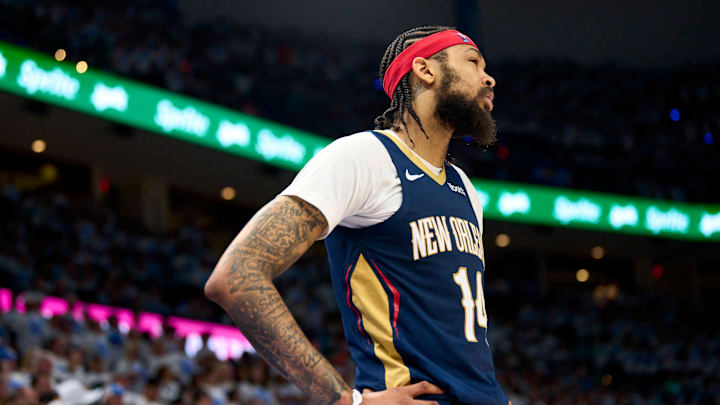Brandon Ingram and his long-term future in the NBA could be at a boiling point. No one is denying Ingram has talent. HIs overall body of work is solid as well, with career averages of 19 points, five rebounds, and four assists, shooting 47 percent, 36 percent from three, and 79 percent on free throws. A former All-Star and Most Improved Player award winner, Ingram has found a home in the NBA as one of the league's best players. Yet, Ingram isn't viewed as elite player, affecting his value.
While rumors of Ingram's interest in a contract extension have been mentioned since the season ended, more news broke regarding specifics of an Ingram contract extension late Thursday night. Ingram's camp reportedly wants a max contract extension worth up to $208 million over four years. While Ingram feels he's worth 'max' dollars, New Orleans and the rest of the league seem to think otherwise. Considering the lack of aggressiveness by teams to acquire Ingram, what's next for him?
Is Ingram a 'max' player in the new CBA?
Domantas Sabonis, Cade Cunningham, Franz Wagner, Tyrese Haliburton, LaMelo Ball, and several others are a few names to have recently signed max contract extension with their teams. Nearly every player who's signed the expensive contract have been franchise centerpieces; players a team drafted in hopes of building their roster with them. In the case of Sabonis, he's reaching the prime of his career with a team that traded for him. Ingram possesses some of these traits but lacks others.
Jayson Tatum and Jaylen Brown also both recently their max contract extensions as the building blocks of the Boston Celtics. Scottie Barnes recently signed his max contract extension as well. A similarity amongst all of these players: Play style, age, and role on the team. Nearly every player mentioned above is a high-level, two-way player. Additionally, nearly every player is younger than Ingram, with many of them already in the class of Ingram in terms of leaguewide rank and skill.
In the case of Sabonis, he's arguably Sacramento's best player, and most consistent. As a skilled passer, the entire offense runs through Sabonis at times, making his value undeniable. For Wagner, his versatility on both sides of the ball makes him a valuable piece alongside Paolo Banchero in Orlando. While he's not the player Ingram is, his potential is still untapped, while Ingram's reached close to his ceiling as a player. Another reason to deny Ingram a max contract is his lack of durability.
The best ability is availability. Without that, Ingram's value is diminished, becoming 'damaged goods'. While he's one of the league's higher-level players, he's not reached elite status in nearly a decade of playing. As a result, Ingram has a few options left long-term to satisfy his financial needs.
Stay in New Orleans and sacrifice a possible max contract
New Orleans believes in Brandon Ingram. They view Ingram as a potential long-term piece alongside Zion Williamson, Dejounte Murray, and CJ McCollum. However, the decision to retain Ingram is more complicated than simply 'bringing the player back'. Ingram had a pedestrian first round series against Oklahoma City in the first round of the playoffs. Furthermore, his inability to stay healthy has decimated the Pelicans when they've needed him. Keeping this in mind, the Pelicans have leverage.
New Orleans wants Ingram to return on a four-year contract worth roughly $180 million. Ingram wants over $200 million. With neither side budging in their negotiations, it appears Ingram will be traded now, at the trade lineup, or leave for nothing in free agency. With many teams best, young players (Cade Cunnigham, etc.) making max-level contract extensions, the veteran Ingram feels he's just as deserving of a max contract extension. If the money is top priority, Ingram will have to play elsewhere.
Chase the money elsewhere
Several contending teams believe Ingram can help them compete for a championship. However, like New Orleans, those teams don't feel Ingram is worth a max contract. Many teams will be acquiring Ingram as a short-term, high-risk, high reward player for a season before he enters free agency. By chasing a contract elsewhere (which it doesn't sound like he's getting from any team), Ingram would have the financial stability he's been seeking for quiet some time
For Ingram, leaving a place where he's found stability could hinder the rest of his career. Playing for teams with a questionable fit or play style may derail his value even further, leaving the Pelicans unsure of their forward depth and production to replace Ingram. Ingram is ultimately the player (and contract) that will make-or-break the Pelicans franchise. They can commit to their current roster, succumbing to the new CBA's 'second apron', or let Ingram walk via trade or free agency.
The reality of the Brandon Ingram dilemma is the lack of suitors available have caused a lack of interest in Ingram overall. Without any interest, there's no reason to throw a massive contract at Ingram long-term, especially when he has zero leverage in nearly any negotiation, New Orleans included. Furthermore, Ingram's likely reached his ceiling as a high-level, second or third option on a championship team. Without positive defense, though, teams question if Ingram's a 'max' player.
